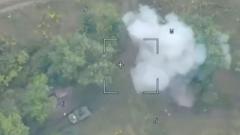Three days into Ukraine’s cross-border attack on Russia’s Kursk region, Ukraine’s President Volodymyr Zelensky has said Moscow must “feel” the consequences for its invasion of Ukraine.
“Russia brought the war to our land and should feel what it has done”, Mr Zelensky said in his Thursday evening address, without directly referencing the Ukrainian offensive.
“Ukrainians know how to achieve their goals. And we did not choose to achieve our goals in the war,” he added.
Russia says at least 1,000 Ukrainian troops, supported by tanks and armoured vehicles, entered its territory on Tuesday morning – in what appears to be one of the largest assaults on Russian soil since the war began.
Russian President Vladimir Putin earlier accused Ukraine of a “major provocation”.
Ukrainian officials have been largely silent on the offensive. The exact situation on the ground is hard to determine, with few specific details released by either side.
“Everyone can see that the Ukrainian army knows how to surprise [and] achieve results,” the Ukrainian president said earlier on Thursday, without directly referencing the assault.
The International Atomic Energy Agency (IAEA) said it was monitoring Kursk’s nuclear plant, according to state-owned Russian news agency RIA-Novosti.
Russia’s defence ministry said on Thursday that its troops were “continuing to destroy” armed Ukrainian units with air strikes, rockets and artillery fire.
The ministry said Russian reserves had been rushed to the region.
The Institute for the Study of War, a well-respected think tank, said geo-located footage showed Ukrainian armoured vehicles had advanced to positions 10km (6.2 miles) into the Kursk region in the first two days of the incursion.
Russia’s military leadership is under severe scrutiny domestically, as some popular and generally well-informed pro-war Telegram channels have said the situation on the ground is not as stable as the Kremlin has suggested.
The influential pro-war Rybar Telegram channel strongly criticised the highest ranks of the Russian military on Wednesday, saying that “for two months the full information was sent to the useless headquarters”, adding that there was enough time “to make an appropriate decision”.
Local leaders in regions adjacent to Kursk, in both Russia and Ukraine, have told residents to leave for their safety.
On Wednesday, the head of the Ukrainian region of Sumy, Volodymyr Artyukh, ordered the evacuation of areas bordering Kursk.
In the Russian region of Belgorod, governor Vyacheslav Gladkov said on Thursday that settlements across his province had been attacked by Ukrainian forces over the past 24 hours.
Ukraine’s key allies seemed surprised by the offensive – with White House press secretary Karine Jean-Pierre saying the US was reaching out to Ukraine to better understand what it hoped to achieve.
This is not the first incursion into Russia by fighters based in Ukraine. Some groups of anti-Kremlin Russians launched raids last year, which were repelled.
The forces crossed into the Belgorod and Kursk regions again in March, where they engaged in clashes with Russian security forces.
On Wednesday evening, Ukrainian MP Oleksiy Honcharenko said the Ukrainian army had established control over the Sudzha gas hub, a major facility involved in the transit of natural gas from Russia to the EU via Ukraine, which has continued despite the war.
It is the only point of entry for Russian gas into the EU.
As of Thursday, gas was reportedly still flowing from Sudzha.
Russia’s National Guard said it had reinforced security around Kursk’s nuclear power station, which lies some 70km north-east of Sudzha.
For the past few months Russia has made incremental gains in eastern Ukraine, as many of Kyiv’s ground forces have faced relentless attacks in the eastern Donbas region.
In a recent interview, Ukraine’s head of defence intelligence, Kyrylo Budanov, said the main offensive by Russian forces “is expected to be over in a month and a half to two months”.

